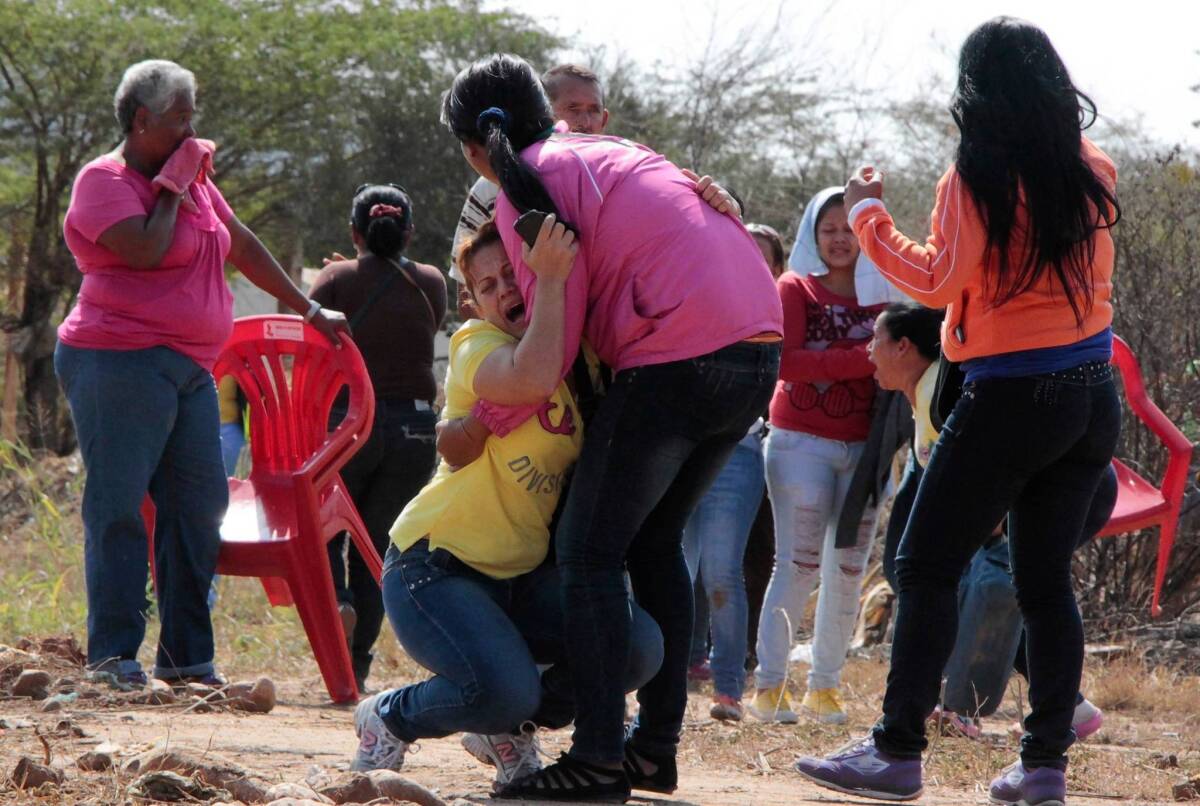Venezuela urged to address prisons; 55 reported dead in riot

- Share via
CARACAS, Venezuela — Human rights groups Saturday urged Venezuela’s government to take action to improve conditions in the nation’s overcrowded prisons, described as some of the worst in Latin America, as the unofficial death toll from several days of rioting at one facility rose to 55.
National Guard members and police at midday were still trying to quell the riot at the Uribana prison in the western city of Barquisimeto, where violence broke out Thursday night when authorities began searching cells for hidden weapons.
Uribana is one of many severely crowded prisons in Venezuela reputed to be under the sway of armed gangs whose tentacles extend to criminal enterprises across the country, including the sale of drugs and control of buildings and farms occupied by squatters.
Although the government has not released numbers, Raul Medina, director of Central Hospital of Barquisimeto, told reporters early Saturday that 55 were dead. Other sources counted 120 wounded. Many of the victims were disfigured, and only 12 have been identified, Medina said.
Iris Varela, minister for penitentiary services, said Saturday at a news conference that once the government regained control of the prison, it would be emptied, with prisoners sent to other jails. The prison would be “reconditioned,” and a decision on whether to reopen it would come later.
Varela issued a statement Friday in which she blamed Barquisimeto news media for announcing the prison search in advance. She said many of the deaths were a “settling of scores” among rival prison gangs.
Early Saturday, Vice President Nicolas Maduro acknowledged that the government had lost control of the prisons and said searches of jails “will continue because the prisons have to be governed by law.” Maduro has taken the reins of government while President Hugo Chavez recovers in Cuba from cancer surgery Dec. 11.
“The Uribana search is part of a plan specifically designed to retake control ... so that jails and prisons are not ruled by violence, mafias, drugs and death,” Maduro said to reporters on state-controlled TV. “It’s an evil that is there and which we have not resolved.”
Chavez, who has not been seen publicly since his surgery, approved in May the expenditure of $540 million to build eight prisons, along with a security system for the entire network. The Barquisimeto prison was in the process of being expanded.
The weapons search was called after one of the construction workers in the project was attacked and severely injured by an inmate in November, Varela said in a statement Friday.
The Uribana prison has a long history of violence and appalling conditions. In a joint statement Friday, two human rights groups noted that the Inter-American Court on Human Rights had called on the Chavez government in 2007 to take immediate steps to alleviate crowding there to “avoid the loss of life.”
“Even then the court was asking the government to seize arms that were in the possession of the prisoners,” the Venezuelan Prison Observatory and Federation of Colleges of Attorneys said in their statement. Not just prisoners but guards and inmates’ families were at risk, the statement said.
The rights groups criticized the abortive prison search, saying excessive force was used.
The opposition said Saturday that the Chavez government had not adequately addressed prison crowding and criticized it for failure to control inmate gangs.
National Assembly member Julio Borges, who also is a leader of the Primero Justicia opposition party, said that in 2011, Varela’s first year as head of the prisons ministry, 507 inmates were killed in the nation’s prisons.
“During the first half of 2012, there were 304 prisoners killed and 527 wounded,” Borges said, and the prison death toll last year exceeded 500.
“This demonstrates the incredible immorality of the government in maintaining Varela as minister with this record.”
Special correspondents Mogollon reported from Caracas and Kraul from Bogota, Colombia.
More to Read
Sign up for Essential California
The most important California stories and recommendations in your inbox every morning.
You may occasionally receive promotional content from the Los Angeles Times.









